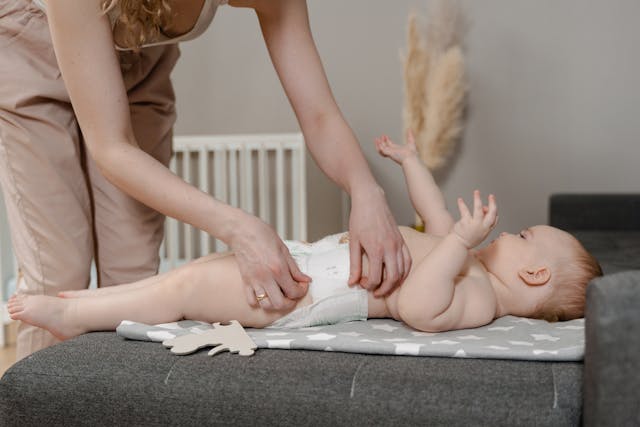When opting for parenting styles, the most effective one involves a balance between providing guidance and allowing independence. But certain ways of parenting are on the extreme. Just like authoritarian parenting where parents control every step of their child, there is a laissez-faire parenting style that gives children freedom and there is no check and balance in setting boundaries and maintaining a structured lifestyle.
Summary of Laissez-Faire Parenting
Laissez-faire is a French term that can be translated in English as, “Let it be” or “leave alone.” This term is used essentially for a permissible parenting style where parents allow their children a great deal of freedom and autonomy. This autonomy in parenting style fosters independence and creativity in children, but the children often find challenges in their future lives like difficulty understanding their responsibilities and setting boundaries.
What Is Laissez-Faire Parenting?
Laissez-faire parenting is generally referred to as a hands-off parenting style or permissive parenting style. It is an approach where parents opt for a non-authoritarian stance of parenting and allow their children a high degree of autonomy where there are no strict rules and regulations set by parents and minimal interference in the child’s decision-making process.
Laissez-Faire Parenting can be defined as:
“Laissez-faire parenting is a non-authoritarian and permissive parenting style with minimal rules and immense freedom. The parents nurture a closely connected bond with children and are too flexible with the child’s desires and have low expectations with their behaviour.”
Characteristics of Laissez-Faire Parents

This hand-off parenting has a highly proactive approach. The parents are highly responsive to the demands and needs of their children while keeping low demands on the shoulders of their children. They are lenient and permissive and give complete freedom to their children to explore and make choices on their own.
However, there are challenges of laissez-faire parenting that can have a negative impact on the children. The key characteristics of this parenting style include:
Little to no control
The laissez-faire parenting style has little to no control over their children’s behaviour. They don’t set strict rules and grant children freedom.
Believe in Independence
Laissez-faire parenting style believes in independence and encourages their children to make their own choices. This can boost confidence and foster creativity in children but it also has potential drawbacks.
Minimal Guidance
Laissez-faire parenting approach focuses on the independence of the child. The parents provide minimal guidance to their children and let them make decisions on their own. This results in positive parenting as they act as advisors rather than dictators. However, the drawback to this style is that laissez-faire parents offer guidelines to their children but do not impose them. The impact of minimal guidance might not only bring positive results but more negative results as children need guidance in their growing stage of life.
Open Communication
Children raised in a laissez-faire parenting style are used to open communication with parents as their parents promote it. This is a positive aspect of this parenting style and children raised in such a way are generally open to communication in their future relationships which results in minimal conflicts.
No Set Schedules
This hands-off parenting style lacks a structured routine or set schedules. There is no discipline and meal times, bedtimes, and other daily activities have no set routine.
Permissive Attitude
laissez-faire parenting is permissive parenting and parents are lenient in setting boundaries for activities like screen time, or any other habit that should have a strict routine. These parents are more towards fulfilling the desires of their children rather than focusing on the side effects it brings.
No Punishment – No Praise
When a child acts in a way that can be referred to as misbehaving, the laissez-faire parent won’t criticize or punish them for their behaviour and neither will praise them. They just leave the child on its own till he gets back to normal.
Some points might come under the positive parenting style but generally, this hands-off parenting brings negative consequences not just in the adult life of children but also in childhood. Let’s learn the signs that are reflected in children who are raised in a Laissez-faire environment.
Signs of a Child Raised in a Laissez-Faire Environment
Laissez-faire parenting is controversial and has its pros and cons. The relationship between a child and the parents is a priority in this parenting style but parents struggle for power. Every teaching style affects children, and in laissez-faire parenting, the impact of minimal guidance can bring some negative results. If you see these signs in a child, he is raised in a laissez-faire environment :
Independent: Children raised in a laissez-faire environment demonstrate a high level of independence. They have high self-esteem and never back off when taking initiative in various aspects of their lives.
Difficulty setting and maintaining boundaries: Children raised by laissez-faire parents are unable to define boundaries and maintain them. They likely are not into respecting social and personal.
Promotes Open Communication: As raised by their parents, these children are open to communication and prefer discussing things that lead to any misconception.
Creative: Children from laissez-faire environments are generally creative as they have the freedom to explore without rigid constraints. This positive attitude of this parenting style nurtures kids with an imaginative and adaptable mindset.
Lack of Discipline: As this hands-off parenting does not involve any strict rules and consequences it may result in a lack of discipline and traditional values.
Adaptability to change: Growing up in an environment without rules and regulations, and with no routine, these children can adapt to change better than others.
Find it difficult to obey rules: Due to leniency in rules and regulations, these children find it difficult to follow the rules wherever they go. This starts with school, where they have to follow certain rules and regulations and obey certain commands.
Impact on Child Development
Every child is different and needs a different parenting style to navigate easily in life. Those who are raised in a laissez-faire parenting style can have both positive and negative effects on them. The effects may vary depending on how the child was treated and what was his temperament, the consistency of the parenting style, and external environmental factors.
Let’s divide the impact into positive and negative that autonomy in this parenting style can bring.
Positive Impact of Laissez-faire Parenting:
Independency: Laissez-faire parenting fosters a sense of independence in children. They are prone to make quick decisions without having to rely on others for advice.
Creative: Laissez-faire parents get into little to no conflict with their children as everyone is independent and of their own free will. The children raised in this positive environment are creative and interested in showing their unique talents.
Open Communication Skills: Children raised by parents who encourage open communication are generally great in communication skills. They are open to communicating their thoughts and expressing their emotions.
Adaptability to Change: Since children are not in any routine or following strict schedules, they are likely to have adaptability to change. They may be more flexible and resilient in facing changes rather than resisting them.
Healthy Relationship: Since these children are raised in a toxic-free environment, they form healthy relations. They don’t nudge their partners, are open to communication, and do not fall into many conflicts.
Negative Impact Laissez-faire Parenting:
Difficulty setting boundaries: The laissez-faire parenting style leads to difficulty for children in understanding and respecting social and personal boundaries. They struggle with self-discipline and appropriate behaviour.
Lack of structure and routine: They have no strict rules or routines to follow and face difficulty in successfully managing time. They might find it difficult to follow the norms of school and adjust to them.
Lack of sense of responsibility: Due to a lack of rules and regulations, children raised in a laissez-faire environment face challenges in understanding and fulfilling responsibilities. This improves their abilities to take on tasks and meet the expectations of others.
Potential lack of Discipline: One of the challenges of laissez-faire parenting faced by the children is their lack of discipline. They might not understand the importance of consequences for their actions, potentially affecting their behaviour in various contexts.
Can Laissez-Faire Parenting Change?
Definitely! Anything can change. The laissez-faire parenting style can change with intentional efforts by the parents. If they realize the emotional effects on children of their parenting style, they will prefer adopting positive parenting practices that contribute to a more balanced approach that preserves autonomy while addressing potential drawbacks.
Parents can change their laissez-faire parenting style by:
Increasing Awareness About Emotional Wellbeing – Acknowledging the emotional effects of laissez-faire parenting on children, you can take the first step towards adopting positive parenting practices.
Setting Clear Expectations – Deciding clear boundaries and limits helps children understand the limits and responsibilities within the family. This will help them with future challenges related to discipline and respect for authority.
Giving Freedom with Defined Boundaries – As parents, you can create a balance between freedom and control. By actively involving yourself in your child’s life, you can offer support and advice and grant them freedom according to their age and capability to handle it.
Encourage Open Communication – One positive aspect of laissez-faire parenting is open communication. By building on the positive aspect of open communication parents can continue fostering the expression of thoughts and emotions, actively listen to children’s concerns and provide them with feedback.
Implementing Positive Reinforcement – Instead of completely relying on permissive parenting, you can also incorporate positive reinforcement along with your hands-off parenting style. This will motivate your children to follow rules and routines when they will be acknowledged and rewarded for their positive actions.
How to Navigate Laissez-Faire Parenting
Laissez-faire parenting style provides children with the freedom to explore and experiment with their surroundings. The parents give the children independence and are least concerned about their child’s matters. They give guidelines but do not impose them and leave everything to the free will of their children.
Navigating through laissez-faire parenting requires creating a balance between granting autonomy to your children and providing necessary guidance and support. It requires you to teach them a way of living a balanced life which has a set of rules, schedules, and discipline.
Every parent should reflect on their parenting style once in a while. You should see the characteristics of your parenting style that are bringing positive impact on your child as well as negative impact. While keeping a permissive approach can boost children’s self-esteem and confidence, establishing clear expectations and boundaries for your child is also important. Since Laissez-faire parenting supports open communication, you should communicate these expectations openly with your children, ensuring they understand your limits and their responsibilities.
Implement consistent routines and provide them with structure to follow. Set time for regular meals, create a bedtime routine and have a schedule for daily activities to create a sense of structured life. With time introduced age-appropriate responsibilities, to develop essential life skills and a sense of accountability.
Fostering independence in children is a great deal, but showing them the right way is the responsibility of every parent. Regularly check in with your child and see what they are doing in life. Learn about them, talk to them about their interests and show interest in their things, and guide them where they need to create a beautiful parent-child relationship.
Conclusion
Parenting is a dynamic process and flexibility is the key to being successful. Laissez-faire parenting style in many ways leaves a positive impact on the child but there are some negative aspects to it also that can be handled with a thoughtful and responsive approach.
Act as a guide and support for your children along with granting them independence. Get involved with them in their daily routine to know about their life and create a bond of friendship.










